【人教版】2017-2018学年度九年级新目标英语:Unit 12 知识点总结
人教版九年级英语unit12知识点归纳
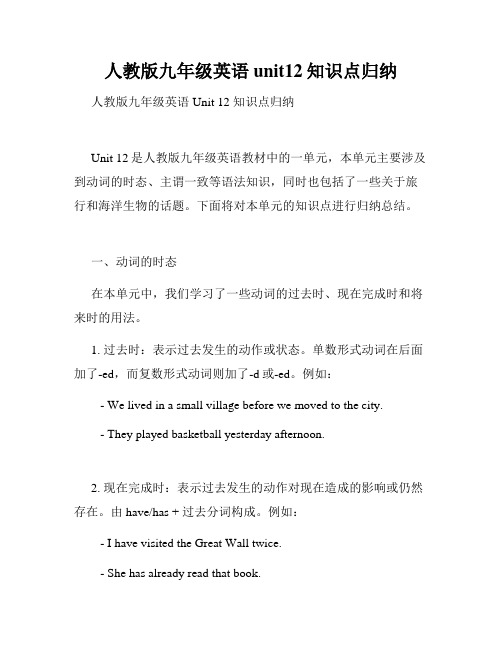
人教版九年级英语unit12知识点归纳人教版九年级英语Unit 12 知识点归纳Unit 12是人教版九年级英语教材中的一单元,本单元主要涉及到动词的时态、主谓一致等语法知识,同时也包括了一些关于旅行和海洋生物的话题。
下面将对本单元的知识点进行归纳总结。
一、动词的时态在本单元中,我们学习了一些动词的过去时、现在完成时和将来时的用法。
1. 过去时:表示过去发生的动作或状态。
单数形式动词在后面加了-ed,而复数形式动词则加了-d或-ed。
例如:- We lived in a small village before we moved to the city.- They played basketball yesterday afternoon.2. 现在完成时:表示过去发生的动作对现在造成的影响或仍然存在。
由have/has + 过去分词构成。
例如:- I have visited the Great Wall twice.- She has already read that book.3. 将来时:表示将来要发生的动作或存在的状态。
由will + 动词原形构成。
例如:- We will go to the beach tomorrow.- They will have a party next week.二、主谓一致主谓一致是指主语和谓语在人称和数上保持一致。
在本单元中,我们需要特别注意以下几点:1. 主语为第三人称单数时,谓语动词需要加-s或-es。
例如:- He often goes to the cinema on weekends.2. 表示时间、距离、金钱等的量词作主语时,谓语动词的单复数形式与它们代表的数量有关。
例如:- Ten yuan is enough to buy a drink.三、旅行话题在本单元中,我们学习了一些与旅行相关的词汇和句型,并通过对话的形式来进行实际应用。
新目标九年级英语unit12知识点汇总
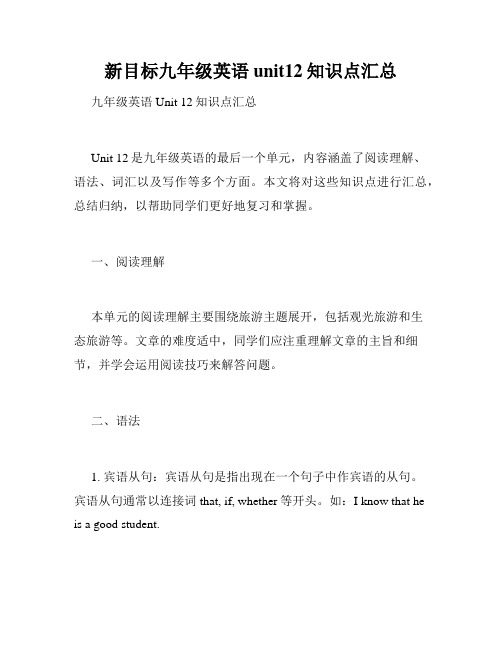
新目标九年级英语unit12知识点汇总九年级英语Unit 12知识点汇总Unit 12是九年级英语的最后一个单元,内容涵盖了阅读理解、语法、词汇以及写作等多个方面。
本文将对这些知识点进行汇总,总结归纳,以帮助同学们更好地复习和掌握。
一、阅读理解本单元的阅读理解主要围绕旅游主题展开,包括观光旅游和生态旅游等。
文章的难度适中,同学们应注重理解文章的主旨和细节,并学会运用阅读技巧来解答问题。
二、语法1. 宾语从句:宾语从句是指出现在一个句子中作宾语的从句。
宾语从句通常以连接词that, if, whether等开头。
如:I know that he is a good student.2. 将来进行时:将来进行时表示将来某个时间正在进行的动作或某个未来的事件。
构成:will be + 动词ing。
如:They will be watching a movie at this time tomorrow.3. 动词不定式的被动语态:动词不定式的被动语态由to be + 过去分词构成。
如:The problem needs to be solved.4. 特殊疑问句:特殊疑问句用来询问某个具体的信息,常见的特殊疑问词有:what, who, when, where, why, how等。
如:What time is it?三、词汇1. 旅游相关词汇:tourist, travel, destination, attraction, guide, sightseeing等。
2. 计量词:本单元涉及了一些计量词,如:a pair of, a group of,a piece of等。
在使用时要注意与名词的搭配。
3. 形容词和副词:学习一些形容词和副词可以丰富语言表达,如:breathtaking, fascinating, slightly等。
四、写作本单元的写作任务是写一篇关于英国旅游的文章。
写作时可以运用所学的词汇和语法知识,通过添加细节和论述观点来丰富文章。
【最新】【人教版】九年级新目标英语:Unit 12 知识点总结
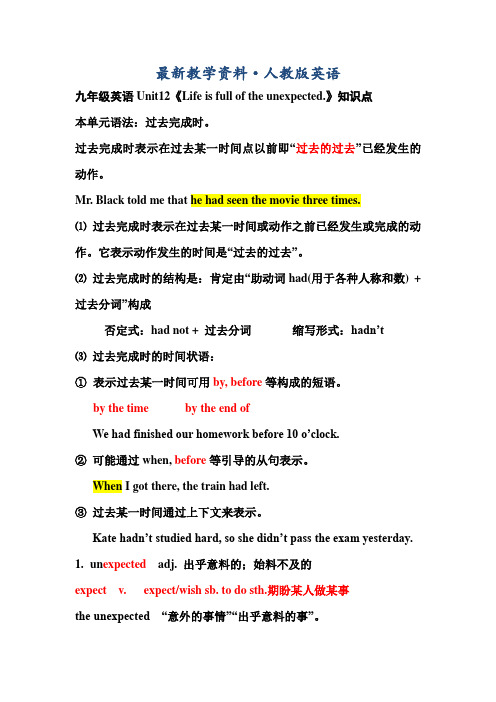
最新教学资料·人教版英语九年级英语Unit12《Life is full of the unexpected.》知识点本单元语法:过去完成时。
过去完成时表示在过去某一时间点以前即“过去的过去”已经发生的动作。
Mr. Black told me that he had seen the movie three times.⑴过去完成时表示在过去某一时间或动作之前已经发生或完成的动作。
它表示动作发生的时间是“过去的过去”。
⑵过去完成时的结构是:肯定由“助动词had(用于各种人称和数) + 过去分词”构成否定式:had not + 过去分词缩写形式:hadn’t⑶过去完成时的时间状语:①表示过去某一时间可用by, before等构成的短语。
by the time by the end ofWe had finished our homework before 10 o’clock.②可能通过when, before等引导的从句表示。
When I got there, the train had left.③过去某一时间通过上下文来表示。
Kate hadn’t studied hard, so she didn’t pass the exam yesterday.1.un expected adj. 出乎意料的;始料不及的expect v. expect/wish sb. to do sth.期盼某人做某事the unexpected “意外的事情”“出乎意料的事”。
the +adj.表示一类人或事物。
the homeless (无家可归者) the disabled(残疾人)the wounded(战争中受伤的人) the injured(事故中受伤的人)2.by the time+时间状语从句(1)时间状语从句的时态是一般现在时时(表示将来),主句用将来完成时;(2)时间状语从句是一般过去式时,主句用过去完成时。
(完整版)人教版新目标九年级英语Unit12知识点及练习(无答案)
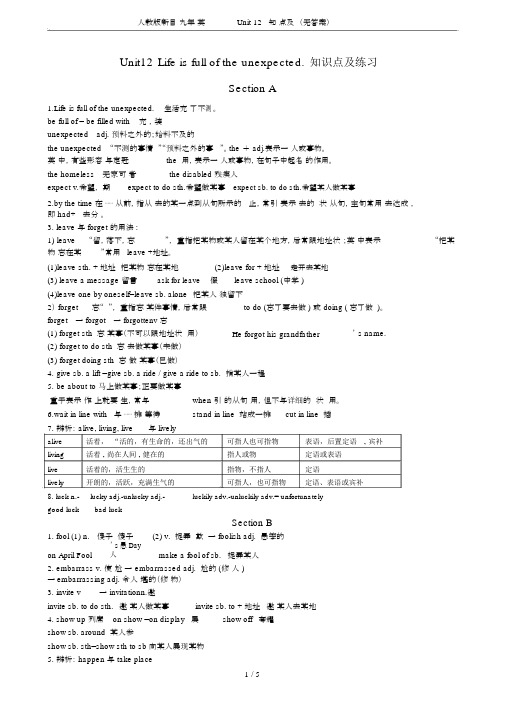
人教版新目九年英Unit 12知点及(无答案)Unit12 Life is full of the unexpected.知识点及练习Section A1.Life is full of the unexpected.生活充了不测。
be full of = be filled with充,装unexpected adj. 预料之外的;始料不及的the unexpected“不测的事情”“预料之外的事”。
the+adj.表示一人或事物。
英中,有些形容与定冠the homeless无家可者the 用,表示一人或事物,在句子中起名的作用。
the disabled 残疾人expect v.希望,期expect to do sth.希望做某事expect sb. to do sth.希望某人做某事2.by the time 在⋯⋯从前,指从去的某一点到从句所示的止,常引表示去的状从句,主句常用去达成,即 had+去分。
3. leave 与 forget 的用法 :1) leave“留,落下,忘”,重指把某物或某人留在某个地方,后常跟地址状;英中表示物忘在某”常用leave +地址。
“把某(1)leave sth. + 地址把某物忘在某地(3) leave a message 留言ask for leave(2)leave for + 地址走开去某地假leave school (中学 )(4)leave one by oneself=leave sb. alone把某人独留下2) forget忘“ ”,重指忘某件事情,后常跟forget → forgot→ forgottenv忘(1) forget sth 忘某事(不可以跟地址状用)to do (忘了要去做 ) 或He forgot his grandfatherdoing ( 忘了做 )。
’ s name.(2)forget to do sth 忘去做某事(未做)(3)forget doing sth 忘做某事(已做)4.give sb. a lift =give sb. a ride / give a ride to sb. 捎某人一程5.be about to 马上做某事;正要做某事重于表示作上就要生,常与when 引的从句用,但不与详细的状用。
人教版九年级英语Unit12单元知识点梳理
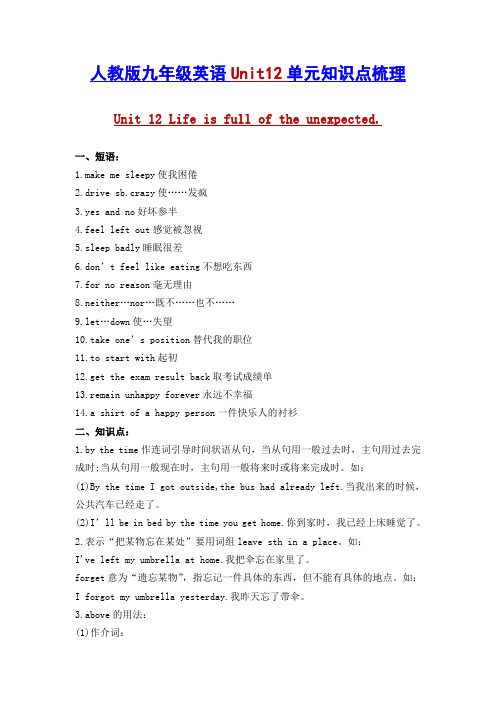
一、短语:1.make me sleepy使我困倦2.drive sb.crazy使……发疯3.yes and no好坏参半4.feel left out感觉被忽视5.sleep badly睡眠很差6.don’t feel like eating不想吃东西7.for no reason毫无理由8.neither…nor…既不……也不……9.let…down使…失望10.take one’s position替代我的职位11.to start with起初12.get the exam result back取考试成绩单13.remain unhappy forever永远不幸福14.a shirt of a happy person一件快乐人的衬衫二、知识点:1.by the time作连词引导时间状语从句,当从句用一般过去时,主句用过去完成时;当从句用一般现在时,主句用一般将来时或将来完成时。
如:(1)By the time I got outside,the bus had already left.当我出来的时候,公共汽车已经走了。
(2)I’ll be in bed by the time you get home.你到家时,我已经上床睡觉了。
2.表示“把某物忘在某处”要用词组leave sth in a place。
如:I've left my umbrella at home.我把伞忘在家里了。
forget意为“遗忘某物”,指忘记一件具体的东西,但不能有具体的地点。
如:I forgot my umbrella yesterday.我昨天忘了带伞。
3.above的用法:(1)作介词:在……上面,如:The moon is above the trees now.月亮现在正位于树梢上。
‚在…之上,超过,如:They are children above six years old.他们是六岁以上的孩子。
人教版英语九年级全册Unit 12知识点详解及练习
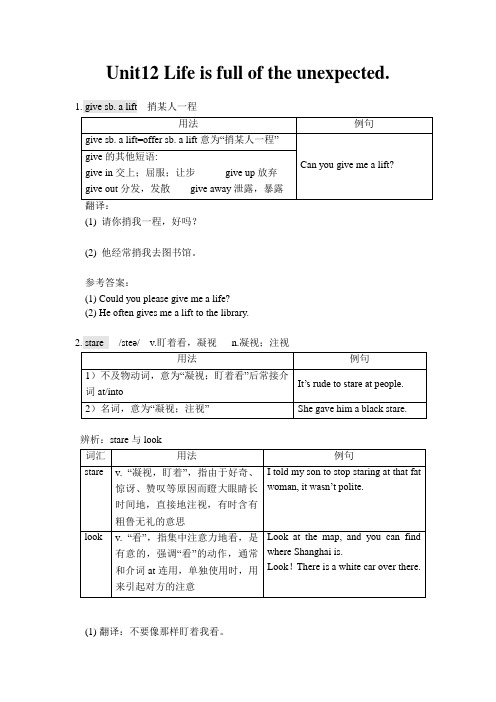
Unit12 Life is full of the unexpected.1. give sb. a lift 捎某人一程(1) 请你捎我一程,好吗?_______________________________________________________________ (2) 他经常捎我去图书馆。
_______________________________________________________________ 参考答案:(1) Could you please give me a life?(2) He often gives me a lift to the library.2. stare /steə/ v.盯着看,凝视n.凝视;注视辨析:stare与look(1)翻译:不要像那样盯着我看。
___________________________________________________________________ (2) Emily ____ the young man hard and finally shamed him into giving up his seatto the old lady.A. stared onB. stared atC. stared forD. stared with参考答案:(1) Don’t stare at me like that.(2) B3. above /əˈbʌv/ prep.在...上面adv.在上面辨析:above,on与over选词填空:above/on/over(1)The plane is flying _____ the clouds.(2)There are five books _____ the desk.(3)There is a bridge _____ the river.(4)I hope the price of the dress will not be____$20.参考答案:(1)above (2)on (3)over (4)above4. burn /bɜ:n/ v.着火;燃烧burn--burnt / burned--burnt / burned辨析:burn, burned与burning(1)翻译:燃烧的旅馆位于城市中心。
新版新目标英语九年级unit12知识点总结.

Unit12 Life is full of the unexpectedSection A1. be full of = be filled with充满,装满2 unexpected adj. 出乎意料的;始料不及的 the unexpected 意外的事情,出乎意料的事the+adj.表示一类人或事物在句中起名词作用有些adj与定冠词the 连用,表示一类人或事物,在句子中起名词的作用 the homeless (无家可归者 the disabled(残疾人The old should be taken good care of by the government.老年人应该被政府好好照顾3. by the time 在……以前,指从过去的某一点到从句所示的时间为止,常引导表示过去的时间状语从句,主句常用过去完成时,即had+动词过去分词。
By the time I got up, he had already left. 当我起床时,他已经离开了。
by now 到现在为止通常与现在完成时连用By now I have collected 200 dolls. 到现在为止,我已收集了二百个布娃娃。
4. leave sth. +地点把某物忘在某处leave → left → left v 离开forget遗忘某物指忘记一件具体的东西,但不能有具体的地点(1leave sth +地点把某物遗忘在某地(2leave for +地点离开去某地(3 leave a message 留言 ask for leave 请假 leave school (中学毕业(4leave one by oneself=leave sb alone 把某人单独留下forget→forgot→fo rgotten v忘记(1 forget sth 忘记某事(不能跟地点状语连用He forgot his grandfather’s name.(2 forget to do sth 忘记去做某事(未做(3 forget doing sth 忘记做过某事(已做5. oversleep =sleep late v 睡过头sleep → slept → slept oversleep—overslept—overslept6.get back to school 回到学校(1get back to 后接表地点的名词,回到某地(2 get back to 后面接人, 回复某人的信件,电子邮件,电话(3 get back 回来,返回,拿回,取回7. go off 发出响声, (闹钟闹响The alarm went off just now. 刚才警钟响了go over 复习 go away 离开 go by (时间过去 go for a walk 出去散步gofishing/shopping/skating/swimming 去钓鱼/去买东西/去溜冰/去游泳8. give sb. a lift =give sb. a ride / give a ride to sb. 捎某人一程9.be about to 忙于;即将做某事。
人教版九年级全一册英语 Unit 12 重点语法知识点复习提纲
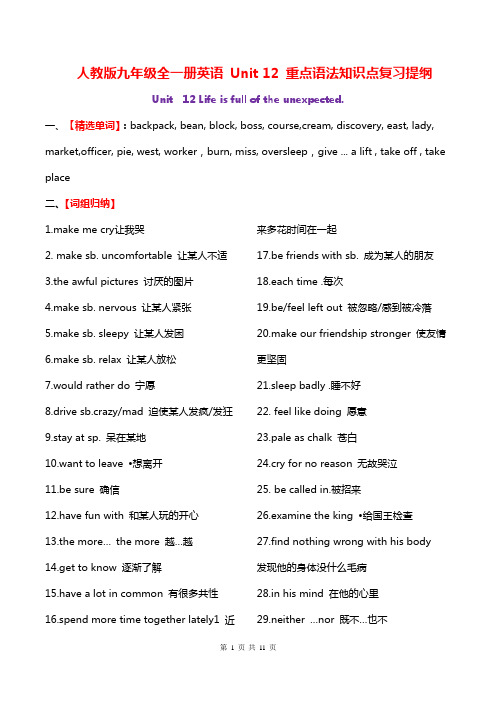
人教版九年级全一册英语Unit 12 重点语法知识点复习提纲Unit 12 Life is full of the unexpected.一、【精选单词】:backpack, bean, block, boss, course,cream, discovery, east, lady, market,officer, pie, west, worker,burn, miss, oversleep,give ... a lift , take off , take place二、【词组归纳】1.make me cry让我哭2. make sb. uncomfortable 让某人不适3.the awful pictures 讨厌的图片4.make sb. nervous 让某人紧张5.make sb. sleepy 让某人发困6.make sb. relax 让某人放松7.would rather do 宁愿8.drive sb.crazy/mad 迫使某人发疯/发狂9.stay at sp. 呆在某地10.want to leave •想离开11.be sure 确信12.have fun with 和某人玩的开心13.the more…the more 越…越14.get to know 逐渐了解15.have a lot in common 有很多共性16.spend more time together lately1 近来多花时间在一起17.be friends with sb. 成为某人的朋友18.each time .每次19.be/feel left out 被忽略/感到被冷落20.make our friendship stronger 使友情更坚固21.sleep badly .睡不好22. feel like doing 愿意23.pale as chalk 苍白24.cry for no reason 无故哭泣25. be called in.被招来26.examine the king •给国王检查27.find nothing wrong with his body 发现他的身体没什么毛病28.in his mind 在他的心里29.neither …nor 既不…也不30.the prime minister 首相31.explain the situation to sb. 向某人解释情况32.have a lot of power 有很大权力33.be worried about /worry about 担心34.lose my power 失去权力35.take one’s position/place 代替某人36.have a lot of wealth 有大量财富37.it’s true that ….是真的38.be followed by 被追随39.top general 大将军40. in three days’time •••三天时间后41.to start with 起初,开始时42.throw rubbish 扔垃圾43.clean up the streets 打扫大街44.get...back 取回,要回45.hand back 发下46. answer well 答的好47.remain unhappy 依然不开心48.a person with power and money 一个有钱有势的人49.search for 搜寻50.even though 即使51.a heavy weight on his shoulders 重担压在肩上52.walk home alone 独自走回家53.the worst day of his life 一生中最糟糕的一天54.stop doing/to do 停止正在做/去干55.think about 考虑56.on the soccer field 在足球场57.miss doing 错过做...58.let sb. down •12.使...失望59.kick sb. off ••开除某人•60.as soon as 一...就61.walk through the door 走过门62.without another word 没有再说一句话63.hear sb. doing 听到某人正在做64.knock on the door 敲门65.let sb. in .让某人进入66.be too hard on sb. 对某人苛刻/严厉67.team effort 团队努力68.the only reason 唯一理由69.support each other.相互支持municate with 同...沟通/交流71. learn from 向...学习72.do sth. with courage ••••有勇气做某事73.rather than 而不是74.fear in his heart 心中的恐惧75.be close to 靠近,接近76.pull together 齐心协力77.to his surprise and relief 令他吃惊和欣慰的78.nod in agreement 点头同意79.not one person's fault 不是一个人的错80.feel lucky to do 感觉幸运地做...81. be on a winning team .在一个会赢的队伍中82.miss a goal .失球83.offer sb. sth.=offer sth. to sb. .给某人提供某物84.be asked to leave 被请求离开85.put so much pressure on sb. ••给某人施加如此多的压力86.work hard together .团结协作,齐心协力87.win /lose a competition 赢/失去比赛88.perform sth. well/badly 表演什么好/坏89.in front of a big group of people 在一大群人面前90.get into a fight with sb. 与某人打架/争吵91. follow me around …到处跟着我 ...三、【重点句式】;1.Life is full of the unexpected. 生活充满了意料之外的事。
- 1、下载文档前请自行甄别文档内容的完整性,平台不提供额外的编辑、内容补充、找答案等附加服务。
- 2、"仅部分预览"的文档,不可在线预览部分如存在完整性等问题,可反馈申请退款(可完整预览的文档不适用该条件!)。
- 3、如文档侵犯您的权益,请联系客服反馈,我们会尽快为您处理(人工客服工作时间:9:00-18:30)。
2017九年级英语Unit12《Life is full of the unexpected.》知识点本单元语法:过去完成时。
过去完成时表示在过去某一时间点以前即―过去的过去‖已经发生的动作。
Mr. Black told me that he had seen the movie three times.⑴过去完成时表示在过去某一时间或动作之前已经发生或完成的动作。
它表示动作发生的时间是―过去的过去‖。
⑵过去完成时的结构是:肯定由―助动词had(用于各种人称和数) + 过去分词‖构成否定式:had not + 过去分词缩写形式:hadn’t⑶过去完成时的时间状语:①表示过去某一时间可用by, before等构成的短语。
by the time by the end ofWe had finished our homework before 10 o’clock.②可能通过when, before等引导的从句表示。
When I got there, the train had left.③过去某一时间通过上下文来表示。
Kate hadn’t studied hard, so she didn’t pass the exam yesterday.1.un expected adj. 出乎意料的;始料不及的expect v. expect/wish sb. to do sth.期盼某人做某事the unexpected ―意外的事情‖―出乎意料的事‖。
the +adj.表示一类人或事物。
the homeless (无家可归者) thedisabled(残疾人)the wounded(战争中受伤的人) the injured(事故中受伤的人)2.by the time+时间状语从句(1)时间状语从句的时态是一般现在时时(表示将来),主句用将来完成时;(2)时间状语从句是一般过去式时,主句用过去完成时。
by the end of +时间点(1)+过去的时间点,主句用过去完成时;(2)+将来的时间点,主句用将来完成时;by+时间点(1)+现在的时间点,主句用现在完成时;(2)+过去的时间点,主句用过去完成时;(3)+将来的时间点,主句用将来完成时。
By the time you came back, I had finished this book.By the time Jane gets home, her aunt will have left for Beijing.By the end of last year, I had stayed in Xinzheng for seven years.By now, I have finished all my homework.3.oversleep =sleep late v 睡过头sleep → slept → slept oversleep—overslept—overslept–What happened ? — I _____.A. oversleepB. oversleepedC. overslept4. give sb. a lift =give sb. a ride / give a ride to sb. ―捎某人一程‖,The poor old woman was standing in the middle of the road and asked someone to ___.A.give him a rideB. give her a rideC. enjoy a rideD. accept a ride5.leave 与forget的用法:(1) leave ― 遗留,落下,忘记带‖,侧重指把某物或某人留在某个地方,后常跟地点状语;(2)forget ― 忘记‖,侧重指忘记某件事情,后常跟to do (忘了要去做)或doing (忘了做过)。
remember to do remember doing♦leave → left → left v 离开(1)leave sth +地点把某物遗忘在某地(2)leave for +地点(目的地)离开去某地(3) leave a message 留言ask for leave 请假leave school (中学) 毕业(4)leave one by oneself=leave sb. alone把某人单独留下6.when的特殊用法―这时,突然‖,用于四种结构1)be doing sth...whenI was thinking of this when I heard my name called.2)be on the point of doing sth...whenShe was on the point of going out when the telephone rang3)be about to do sth...when We were about to start when it began to rain.4).sb. had hardly/scarcely/barely done sth... whenWe had hardly fallen asleep when the bell rang.另:be about to 忙于;即将做某事。
侧重于表示动作马上就要发生,常与when引导的从句连用,但不与具体的时间状语连用。
7.be full of = be filled with充满,装满fill…with..The basket is full of apples. = The basket is filled with apples.8.get/go/come/be back to school=return to school意为―回到学校‖1)get back to 后接表地点的名词,意为―回到某地‖;2)get back to 后面接人,可引申为―回复某人的信件,电子邮件,电话‖等;3)get back 还可表示― 回来,返回,拿回,取回‖等含义。
4)give back=return归还9.My alarm clock didn’t go off!go off 发出响声,(闹钟)闹响The alarm went off just now.go over 复习go away 离开go by (时间)过去go for a walk 出去散步go on 继续go + doing 去做某事go fishing/shopping/skating/swimming去钓鱼/去买东西/去溜冰/去游泳10.rush out 冲出去,冲出…… wait in line with意为―与……排队等候‖stand in line 站成一排cut in line 插队stare at 凝视in disbelief 不相信turn/change into 变land on 意为―着陆;降落于‖be late for迟到keep doing sth 一直做......wake up 醒来wake-woke-woken11.even if / even though/ though/although 都可以引导让步状语从句。
Even if =even though―即使、纵然‖引出的从句叙述的是假设或把握很大的事情though―虽然‖,引出的从句叙述的是事实。
I will try even if I may fail.Though it was very late, he went on working.[注] though 和but 不能同时出现在句中。
12.above1)prep(表示位置)在…正上方;(与below相对)The moon is now above the trees.2)prep表示在地位、级别、能力、资历、重要性等方面―超过‖He is above me in every way.3) adv. ―在上面; 在上文‖。
See the examples given above.2000 meters above the sea level 海拔2000米13.alive, living, live与livelylively1)live ―活着的‖,通常指物,不指人,常用来作定语放名词的前面。
还指―实况转播的‖。
例如:a live fish 一条活鱼。
Do you like a live show or a recorded show ?2)living意为―活着‖强调说明―尚在人间‖,―健在‖,可用来指人或物,作定语或表语。
例如:.My first teacher is still living .English is a living language .A living language should be learned through listening and speaking . He is regarded as one of the best living writers at present .注意:living 前加上 the , 表示类别,指―活着的人们‖。
例如:The living must finish the work of those dead .living 还可用于短语,例如:make a living by doing谋生。
3)alive 意为―活着‖,侧重说明生与死之间的界限(本来会死但没有死),既可指人,也可指物;可用来作表语,后置定语或宾补。
例如:He is dead , but his dog is still alive .He wanted to keep the fish alive.This is a fish alive.4)lively 则意为―活泼的‖,―活跃‖,―充满生气的‖,可作定语、表语或宾补,既可指人,又可指物。
例如:Jenny is a lively girl . Everything is lively here . 这儿一切都生机勃勃。
He had a strange way of making his classes lively and interesting .1). Jin Yong is one of the greatest and oldest writer. He is still .A. living; aliveB. living; livingC. alive; livingD. alive; lively2).—Is his grandmother still ?—Yes, she is 102 years old!A. liveB. livingC. aliveD. Lively14.take off 在此句中意为―起飞‖,off 在此为副词表示―离开;走开‖。
